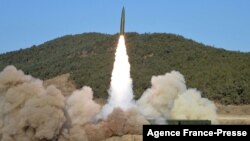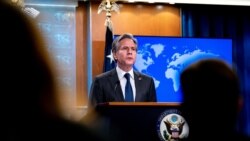North Korea’s latest launch involved a pair of missiles fired from a train, North Korean state media reported, offering details about what was already its third launch this year.
Pictures posted by the Korean Central News Agency (KCNA) showed a pair of dark green missiles emerging from a rail-based launch platform in a mountainous area filled with exhaust plumes.
North Korean leader Kim Jong Un, who was at the test earlier this week, apparently did not attend the Friday launch, according to the KCNA report.
The drill was meant to test the response time and alert posture of the country’s railway-borne missile regiment, which received only short notice ahead of the launch, it said.
The launch involved two “tactical guided missiles,” which accurately hit their targets in the sea off Korea’s east coast, it said.
Earlier, South Korea, which closely tracks the North’s launches, said the missiles traveled about 430 kilometers.
It was North Korea’s second reported railway-based missile test since September.
The train-based launch system gives North Korea another option for launching and protecting its rapidly expanding missile arsenal.
North Korea has tested four missiles, during three separate launches, within the past 10 days. That pace is reminiscent of 2017, when U.S.-North Korea relations were at a low point.
The previous two tests involved what North Korea claims are hypersonic missiles. Although defense analysts say North Korea may be overstating its capabilities in this area, such weapons are likely more difficult for U.S. missile defenses to detect and intercept.
Firmer US response
The United States this week imposed unilateral sanctions on five North Koreans it alleged were helping procure supplies for Pyongyang’s weapons program.
Speaking at a background briefing Friday, a U.S. official said Washington also wants the U.N. Security Council to extend sanctions against the five North Koreans.
China and Russia are permanent members of the Security Council and would have to approve such measures. Both have recently called for North Korea sanctions to be relaxed, rather than expanded.
The U.S. has also offered a tougher rhetorical response to the recent North Korean launches.
In a telephone call Friday with South Korean Foreign Minister Chung Eui-yong, U.S. Secretary of State Antony Blinken condemned the launches, which he had previously described as “profoundly destabilizing” and meant in part to “get attention.”
North Korean response
Hours before its latest launch, North Korea’s Foreign Ministry lashed out at Washington, accusing the United States of “intentionally escalating the situation” with unilateral sanctions.
“If the U.S. adopts such a confrontational stance, the DPRK will be forced to take stronger and certain reaction to it,” a Foreign Ministry spokesperson said, according to state media, which used an abbreviation of North Korea’s official name, the Democratic People’s Republic of Korea.
Under President Joe Biden, the United States has repeatedly offered to hold nuclear talks with North Korea “anywhere, anytime.” North Korea has ignored or rejected the offers, saying Washington must first provide more concessions and drop what it calls a “hostile policy.”
North Korea walked away from talks with the United States in 2019, after the two sides could not agree on a deal to relax U.S. sanctions in exchange for steps by North Korea to give up its nuclear weapons.
Bigger tests coming?
Duyeon Kim, adjunct senior fellow at the Center for a New American Security, said it is obvious that North Korea is “angry and protesting” the U.S. sanctions.
“We should expect Pyongyang to protest through a show of force, which serves a dual purpose of perfecting its nuclear weapons technology through tests to achieve Kim Jong Un's goals he set out last year,” Kim told VOA.
“Washington is right to, and should, penalize any provocation that violates U.N. Security Council resolutions and threatens the region,” she added in an email.
North Korea has several possible motivations for testing missiles, including shoring up domestic political support, ensuring the performance of new weapons, demonstrating deterrence and provoking the United States and its allies.
However, since it resumed missile tests following the breakdown of talks in 2019, North Korea has refrained from any nuclear tests or long-range missile tests that would risk a firmer U.S. response.
Analysts have said North Korea may be unwilling to conduct more provocative tests ahead of the Winter Olympics, to be hosted next month by China, North Korea’s ally.
“North Korea is moderating its behavior since keeping the trust and alliance of China is important to them. North Korea will not push tensions with the United States beyond a certain level before the Olympics,” said Lim Eul-chul at the Institute for Far Eastern Studies in Seoul.






